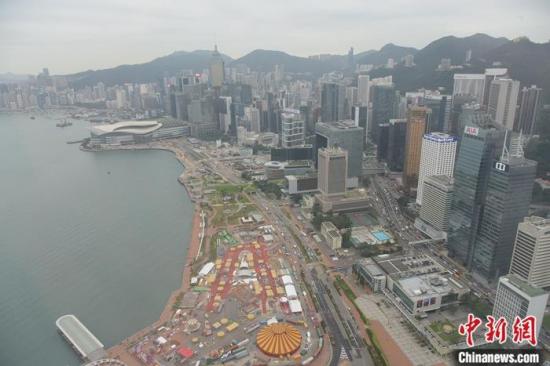(Fighting new crown pneumonia) report says epidemic situation and economic downturn will affect long-term trend of Hong Kong property market
China News Agency, Hong Kong, March 11th (Reporter Liu Chenyao) Dade Liangxing, a world-renowned real estate service provider, released a report on the review of the residential and property investment market in the first quarter of 2020. According to the report, after the Hong Kong property market enters 2020, buyers will enter the market with more atmosphere The original improvement, but the outbreak of new pneumonia has brought another wave of impact to the local area. The report predicts that the epidemic situation and economic downturn will continue to affect the prospects of the property market.
According to the Hong Kong Special Administrative Region Government's temporary sale and purchase agreement for residential properties, the number in January was 2,762, a month-on-month decrease of 13%, and in February rose to 3572, a month-on-month increase of 29%.
Data map. Photo by Li Zhihua of China News Agency
In this regard, Tao Ruhong, vice president of Greater China of Dade Lianghang and director of strategic development consulting department of Greater China, said: The February figures reflect the rebound in residential trading, and the secondary market is particularly active because the property market is supported by several short-term positive factors. With the spread of the new pneumonia epidemic and more variables in the global economic performance, he expects the number of residential transactions in March to be slightly higher than the February level, reaching 3,900. The total volume of residential transactions in the first quarter is expected to be 10,234. "It is down 21% quarter-to-quarter, which is the lowest residential transaction volume since the first quarter of 2016." Tao Ruhong said.
As far as Hong Kong is concerned, Tao Ruhong said that given that Hong Kong has entered a technical economic recession, Hong Kong's unemployment rate is expected to rise to more than 5%, and the outlook for the external economic environment is also not good. In this context, property prices are expected to further Down.
From the perspective of the epidemic situation, Tao Ruhong bluntly stated that although the epidemic situation is expected to calm down in the second half of the year, the economic impact will be more long-term. It is expected that more shops and businesses will be closed, and the economic recession will intensify. The Hong Kong property market has had a negative impact. "Compared with the SARS epidemic in 2003, as the property market in Hong Kong has experienced a downward trend for six years at that time, it is recovering from the trough and coupled with policy support, the market conditions have rebounded significantly; however, the market is now entering a downward cycle and it is unknown whether there is any correlation. Supportive policies, it will be difficult to judge the market outlook based entirely on SARS experience. "
In addition, the pneumonia epidemic and the buyer and seller's unwavering actions have left the property investment market almost frozen. As of mid-March, the property investment market recorded only 17 large-scale transactions of HK $ 100 million or more, down 60% quarter-to-quarter, and the total turnover was temporarily HK $ 4 billion, also a sharp fall of 76% from the previous quarter.
Investigating the reasons, Gao Weixiong, executive director of DTZ ’s Hong Kong Capital Markets Department, analyzed that buyers and sellers have been stuck in the market in recent months. On the one hand, investors have either stayed on the sidelines or wanted to take advantage of the low prices, but the owners have not been under pressure due to the current low interest rates. It needs to be sold at a cut price; on the other hand, Hong Kong investors have diversified their investments in overseas markets in response to the epidemic and economic prospects. (Finish)

